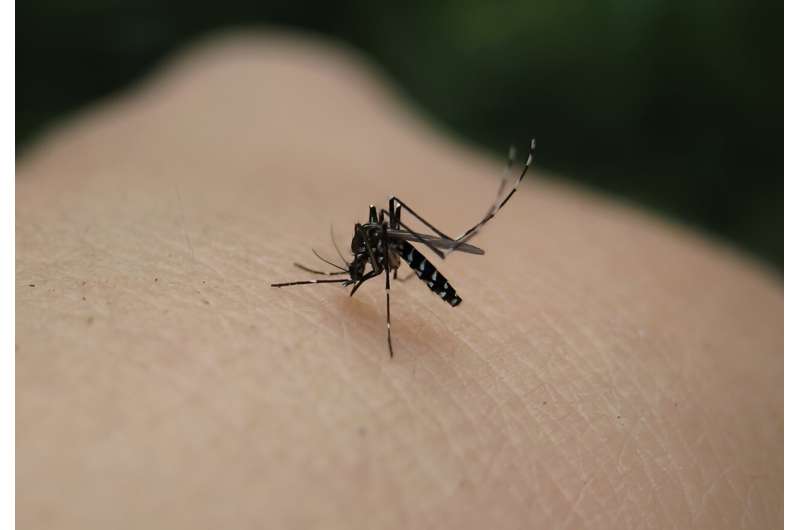This article has been reviewed according to Science X's editorial process and policies. Editors have highlighted the following attributes while ensuring the content's credibility:
fact-checked
trusted source
proofread
Mosquitoes: Fact and fiction when it comes to bite prevention

No one likes mosquitoes. Their bites can cause uncomfortable and sometimes painful reactions and put a damper on even the best summer soiree. They can also carry diseases and viruses such as Eastern equine encephalitis (EEE), the most dangerous virus spread by insects in North America, and West Nile virus, the leading cause of mosquito-borne disease in the U.S.
West Nile Virus was recently detected in a few Massachusetts counties, and the next few weeks will be peak risk, according to Sam R. Telford, III, professor in the Department of Infectious Disease and Global Health at Cummings School of Veterinary Medicine at Tufts University, a commissioner for the Central Massachusetts Mosquito Control Project, and a member of the state Mosquito Advisory Group.
It's important to remain vigilant and protect yourself from mosquitoes. Products such as citronella oil advertise themselves as effective against mosquitoes, but citronella has been proven less effective than other products such as DEET. Newer to the market are patio products such as appliances that heat repellents to keep groups safe outdoors, and were shown to be highly effective against four species of mosquitoes. Wearables, on the other hand, sound like a great idea but studies show they do not reduce mosquitoes' attraction to humans.
With these products making up a fraction of the overwhelming variety of options on the market, it can be hard to know what really works. For that reason, we connected with Telford for fact-based ways to keep you and your loved ones safe from mosquitoes.
Tips: Myth or Fact
Wearing long sleeves and long pants will protect you from mosquitoes: MYTH
Have you been outdoors in the warmer months, clad in pants and long sleeves, but went home with mosquito bites? It's likely due to the fact that mosquitoes can bite through tight-fitting clothing if it's made of thin material. Try wearing loose-fitting clothing that has been treated with an insecticide like permethrin (0.5%), but be careful with clothing that is still wet from the treatment—permethrin is toxic to cats.
Bug sprays can go a long way toward protecting you: FACT
Insect repellents with active ingredients such as DEET, picaridin, IR3535, or oil of lemon eucalyptus will help protect you from mosquitoes, among other insects. The Environmental Protection Agency has a tool to help find the right insect repellent for you. Certain EPA-approved products are safe to use on children and infants as young as two months, but read the label for instructions. For infants, invest in mosquito netting to cover their outdoor spaces, like playpens or strollers.
Mosquitoes are attracted to certain people more than others: FACT
Studies have shown that certain biological factors make mosquitoes more attracted to some people over others, though why remains a mystery. Some species of mosquitoes prefer birds or mammals, while others prefer humans. Independent of species, mosquitoes tend to prefer humans with type O blood, and another bodily fluid—sweat—can also have an impact. Researchers have found that mosquitoes search for people with higher body temperatures and receptors in their antennae are trained to detect specific chemicals in our sweat.
Mosquitoes can lay eggs in most standing water: FACT
Mosquitoes love containers that collect water, like upright buckets, uncovered trash barrels, and even clogged roof gutters. Depending on the species of mosquito, eggs can hatch anywhere from a few days to several months after being laid, which can make for a miserable summer. Keep your yard safe by overturning buckets or potting containers (or store them in a shed or garage), covering barrels, and keeping areas like gutters or bird baths clean.
Both male and female mosquitoes bite: MYTH
It's the lady mosquitoes you need to look out for, which is harder since they're smaller than their male counterparts. Female mosquitoes bite for a simple reason: to produce eggs—and they'll lay an average of 100 at a time. In the process, though, they can get infected with viruses and parasites when they bite infected species (human or animal). And although mosquitoes are more active in the dusk hours, they can bite at any time.
For more information on mosquitoes and how you can protect yourself, visit the websites of the CDC and your local department of public health.




















